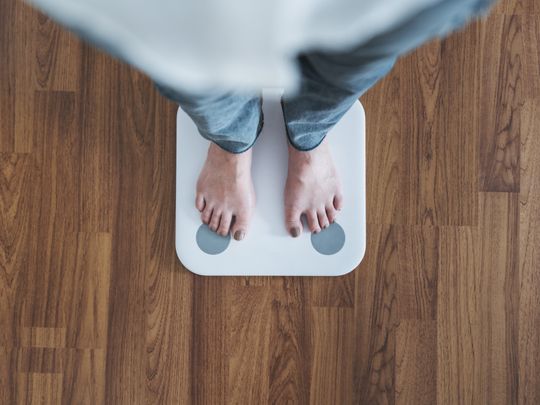
Dubai: Once Ramadan gets over on Sunday or Monday and people revert to regular eating hours, most people are unlikely to keep off all the weight they lost during the long hours of fasting.
Doctors and nutritionists explain that there is a science and discipline to slowly resuming eating habits and choosing right food during Eid and beyond. Many tend to lower all their guards and binge on rich meat dishes and desserts and tend to completely neutralise or undo the hard work of new weight milestones they may have achieved. Many hospitals report cases of severe indigestion and gastritis in the first few days of Eid because of binge-eating.
Do not over-eat
Dubai-based clinical dietician Mitun De Sarkar said: “After a month of fasting during Ramadan, the digestive and gastric system makes adjustments to not consume food or liquids for a prolonged period of time. There is a possibility of gastric juices, such as stomach acids and bile secretions, not being produced in normal quantities as it would have been in case of regular eating patterns. This adjustment is made by the body over the month of fasting to cope with the lack of food and liquids. Therefore, it is important to ensure that once regular food consumption resumes, one should be mindful of not shocking the system. The transition to normal meal times should be gradual. Portion control is very important when the festivities begin.”
Cumulative effect
Dr Yogesh Shastri, specialist gastroenterologist at NMC Specialty Hospital, Abu Dhabi, said: “After disciplined fasting through Ramadan, it is only natural for people to give in to binge-eating during Eid. The food consumed during Ramadan is usually rich as well as high in protein and fat. The alteration in circadian rhythm is also of significance: Individuals become more active after sunset and may be sleep-deprived during the day. The body acclimatises to being without calorific intake and hydration for more than 14 hours as was the case this year. Switching back to abundance can be challenging and there are certain ground rules to re-boot one’s metabolism to avoid weight-gain after Ramadan.”
Count your calories
De Sarkar added that it was important to control the calorie intake. “During Eid, when people resume eating at all hours, it is best to start with similar intake like the body was used to during Ramadan. Alternatively, one can average out one’s weekly consumption and target a similar number for the next few weeks. After two weeks, one can add an extra 200 calories to 400 or 500 calories. This slow addition of calories makes up for the meal that you had skipped during Ramadan.”
Continue intermittent fasting
Soon after Ramadan, it can be a good idea to continue intermittent fasting for a couple of weeks and slowly add two hours before and after to the eating schedule to slide in to normal eating routine, De Sarkar said.
Dr Shastri recommended mindful eating, proper hydration and regularisation of sleep patterns.
What to eat
Post-fasting, people must choose complex carbohydrates, such as barley, wheat, rice, oats, millets, semolina, beans, lentils, whole meal flour etc. It is advisable to pick fiber-rich food that can be digested slowly, such as wheat bran, cereals, whole wheat, grains and seeds, potatoes with the skin, vegetables such as green beans and almost all fruit.
Planning post-Ramadan schedule
It is important that all those who resume eating three full meals and more must have a definite meal schedule during Eid and later to avoid bingeing during the long Eid holiday week.
The heaviest meal of your day must be your breakfast, which should include the right amount of dense carbohydrate, protein and fat to provide fuel for the day. This will help an individual keep a proper control on the quantity of eating. According to Dr Shastri, people tend to binge despite being full, if they skip breakfast and that leads to weight gain.
Chew your food well
Consume three meals a day, containing protein as well as complex carbohydrates with high fibre such as vegetables, and the meals should be timed appropriately to provide fuel to our body and brain, Dr Shastri said. “Do not forget to eat slowly, chewing every morsel well, in order to ensure better digestion. Also, one must concentrate on the act of eating rather than combining it with reading, watching television or engaging on social media. Avoid late meals and have dinner at 7pm to give the body time to metabolise the food. Replace high sugar foods with fruit,” he added.
Hydration
Post-Ramadan, it is very important to replenish lost fluids said De Sarkar. “Make sure to have enough water and hydrating fluids to replenish the body’s electrolyte balance to regularise your metabolism. Many people tend to overeat when they are thirsty.”
Dr Shastri added: “The human body requires at least 1.5-2 litres of fluids (8-10 glasses) daily. Avoid bottled juices and high-calorie drinks and shakes as they are calorie bombs — some of them may even carry more than 500 calories, more than what we eat in a meal, and make you gain weight. Best would be soups, coconut water, fresh juices etc. Another advantage of fluids is that these give you a sense of fullness and prevent overeating. Fizzy drinks must be avoided and caffeine intake must be restricted to 1-2 cups of tea or coffee a day. Alcohol should be cut out totally as it is a source of empty calories.
Exercise
It is important to reintroduce a regular physical fitness schedule. Try and reintroduce an exercise regimen at least four days a week for at least 30-40 minutes, Dr Shastri recommended.
Dr Shastri specifically cautioned against sudden reintroduction of a punishing physical fitness schedule. “Avoid going for a 10km run on the first day after Ramadan. Instead, reintroduce the fitness programme. It is important to resume exercising gradually as our muscles are deconditioned and need acclimatisation to come back to previous exercising capacity. Timing of the exercise is very important. Ideal is to exercise in the morning, but those who are late-risers can do this in the evening too. Do not indulge in heavy exercises for at least three hours after meals.
Sleep is vital
Reintroduce eight hours of sleep through the night and restore the body’s circadian rhythms. Sleep schedule gets disturbed during Ramadan, which may lead to unhealthy metabolism. Once our life gets back to routine, this circadian rhythm has to be restored to normal. Dr Shastri pointed out: Practise relaxation, Pilates, Yoga etc to regain your sleep rhythm if it is disturbed.”
Meal choices should lean towards fresh produce and lean meats. Foods high in saturated fats and processed foods should be avoided, as they may cause gastric distress and can cause unwanted weight gain, cautioned De Sarkar.
Example of a balanced meal plan to avoid bingeing post Ramadan:
• Start with Breakfast at 11am, lunch by 2pm and dinner by 7pm. Slowly this can transition to breakfast at 9am, with some small snacks in the middle of the day.
• Breakfast can be Oatmeal with flax or chia seeds, sprinkling of cinnamon and some berries or egg white with whole meal toast and veggies.
• Lunch can be brown rice with fish or chicken and vegetables.
• Dinner can be a big bowl of salad with beans, chicken and raw nuts.
Source: Mitun De Sarkar
Dos and don’ts:
• Avoid over-eating and binge eating.
• Chew every morsel of food well.
• Cut back on fried and junk food.
• Follow the one–third principle: Fill only one-third of your stomach with food, one-third with fluids, and leave the remaining space for better breathing.
• Have three healthy meals with breakfast being your largest meal with balance of complex carbs, proteins, heathy fat and high fibre.
• Avoid late-night dinners.
• Limit excessive consumption of caffeinated and carbonated drinks, such as coffee, tea and cola.
• Replace creamy desserts with fresh fruit.
• Drink a minimum of 1.5-2 litres of fluids per day.
• Avoid bottled juices and high-calorie shakes.
• Quit smoking, if you are a smoker, as smoking irritates the stomach lining and increases acidity.
• Avoid alcohol as it contains empty calories.
• Introduce at least four days of exercising in a week, with each session lasting a minimum of 30-40 minutes.
• Avoid getting into very heavy exercising in the beginning.
• Sleep early and make sure you get a restful seven-eight hours of sleep during the night.
Source: Dr Yogesh Shastri













